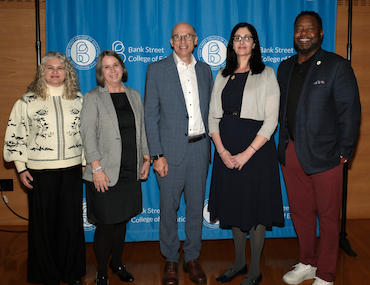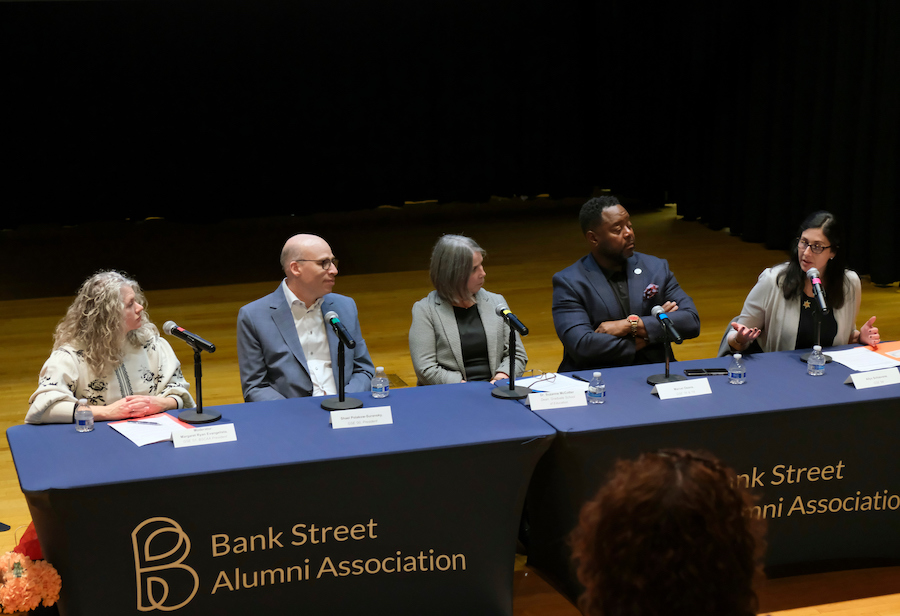On October 29, alumni and students from Bank Street Graduate School of Education gathered for the 2025 Bank Street Dialogue: Education Today, an annual event that invites the community to engage in thoughtful conversation about the issues impacting education and how the College is taking action to address them.
 Hosted by the Bank Street College Alumni Association (BSCAA), this year’s event featured a panel discussion on “Teaching in Challenging Times: Where Do We Go From Here?” moderated by BSCAA president Margaret Ryan, GSE ’01. Panelists included Shael Polakow-Suransky, GSE ’00, President, Bank Street College; Suzanne McCotter, Dean, Graduate School of Education; Allyx Schiavone, GSE ’94, Executive Director, Friends Center for Children (New Haven, CT); and Marcel Deans, GSE ’06, ’18, Superintendent, Bronx High Schools (Districts 8, 10, and 11).
Hosted by the Bank Street College Alumni Association (BSCAA), this year’s event featured a panel discussion on “Teaching in Challenging Times: Where Do We Go From Here?” moderated by BSCAA president Margaret Ryan, GSE ’01. Panelists included Shael Polakow-Suransky, GSE ’00, President, Bank Street College; Suzanne McCotter, Dean, Graduate School of Education; Allyx Schiavone, GSE ’94, Executive Director, Friends Center for Children (New Haven, CT); and Marcel Deans, GSE ’06, ’18, Superintendent, Bronx High Schools (Districts 8, 10, and 11).
The candid conversation examined the future of progressive education amid increasing challenges for schools and the teaching profession—from classroom libraries facing scrutiny over book selection to families’ concerns about student well-being and the growing impact of political discourse on young people.
In his opening remarks, President Polakow-Suransky highlighted Bank Street’s credo, framing the discussion around the core values that continue to guide the College’s work: “Our history, our mission, and our commitment to children and educators provide us with a powerful compass. In practice, that means remaining intellectually curious, flexible, and courageous. It means, as our credo articulates, combining gentleness with justice. And most of all, it means striving to live democratically, in and out of schools.”
The conversation began with panelists reflecting on what progressive education means in today’s social, economic, and political climate. They spoke about nurturing the whole child, creating hands-on learning opportunities, deeply understanding each child as a learner, and centering children in inclusive spaces where differences are celebrated.
Next, Deans answered a question about how he supports teachers in navigating increasing scrutiny around classroom materials and content, such as on the topics of identity, belonging, and history. He noted tensions between education and political spaces and the importance of empowering educators to lead in ways that are responsive and relevant to students’ needs. Reflecting on this challenge, he said, “How do I, as a district leader, make sure I disrupt what was, and what has been, and what the expectations have been in those spaces where I know those expectations haven’t served my young people well.”

Schiavone spoke about balancing policy and community demands with protecting the integrity of her organization’s educational mission. “My biggest sense is, if the system is not working, then we shouldn’t try to perpetuate it. We should be changing it. We should be disrupting it,” she said as she spoke about compensation for early childhood educators and the Teacher Housing Initiative at the Friends Center for Children, which offers free housing for Friends Center educators. “The adults who are taking care of children, in our case, the youngest friends, need to be taken care of themselves.”
McCotter discussed systemic issues driving teacher shortages and morale and shared how leaders can help educators feel seen, valued, and sustained. She noted the absence of joy in teaching, saying, “It’s about making sure that we center how important teachers are because of the joy they bring, because of the connections that are made, because of their importance to the community.”
She added, “One of the things that leaders can do is make sure that we’re highlighting where those joy and connections really happen, having really marvelous examples that we can go back to, that we can show our students, and make them really want to be teachers.”
Polakow-Suransky spoke about the future of education in the face of growing challenges. “One of the interesting things about this moment in our history is what can be built,” he said, reflecting on possibilities ranging from increased state support to the creation of new organizations and alliances. “When you see that the system isn’t built to support the actual needs of those who work in it and study in it. How do you build something different?”
The discussion concluded with panelists sharing practices that have helped them stay grounded and resilient amid uncertainty. Attendees also had the opportunity to ask the panelists questions about timely topics, such as the integration of artificial intelligence in progressive education.
To conclude the evening, students, alumni, faculty, and staff gathered in the lobby for a reception to connect and network with each other and learn more about Bank Street’s programs and initiatives.